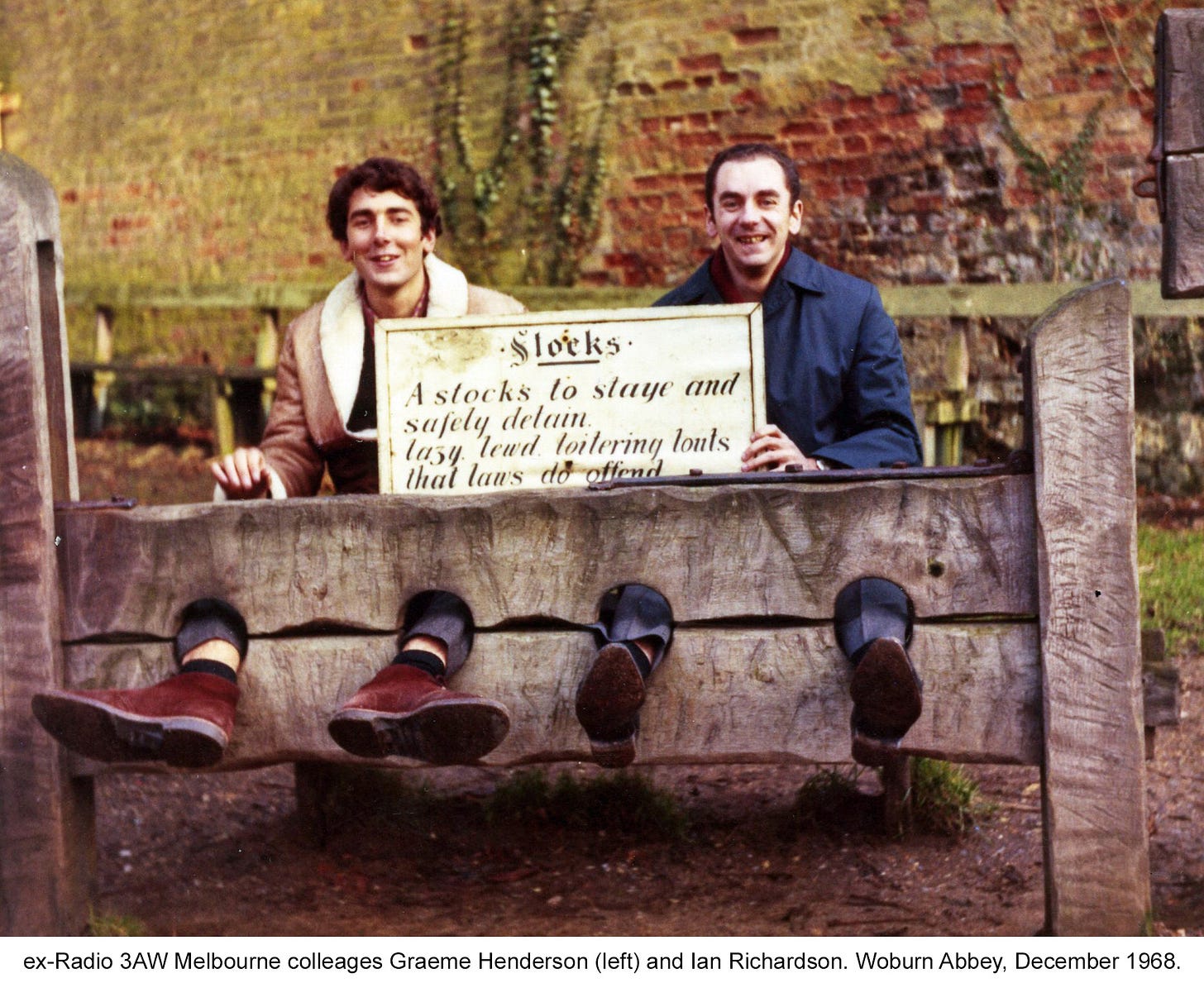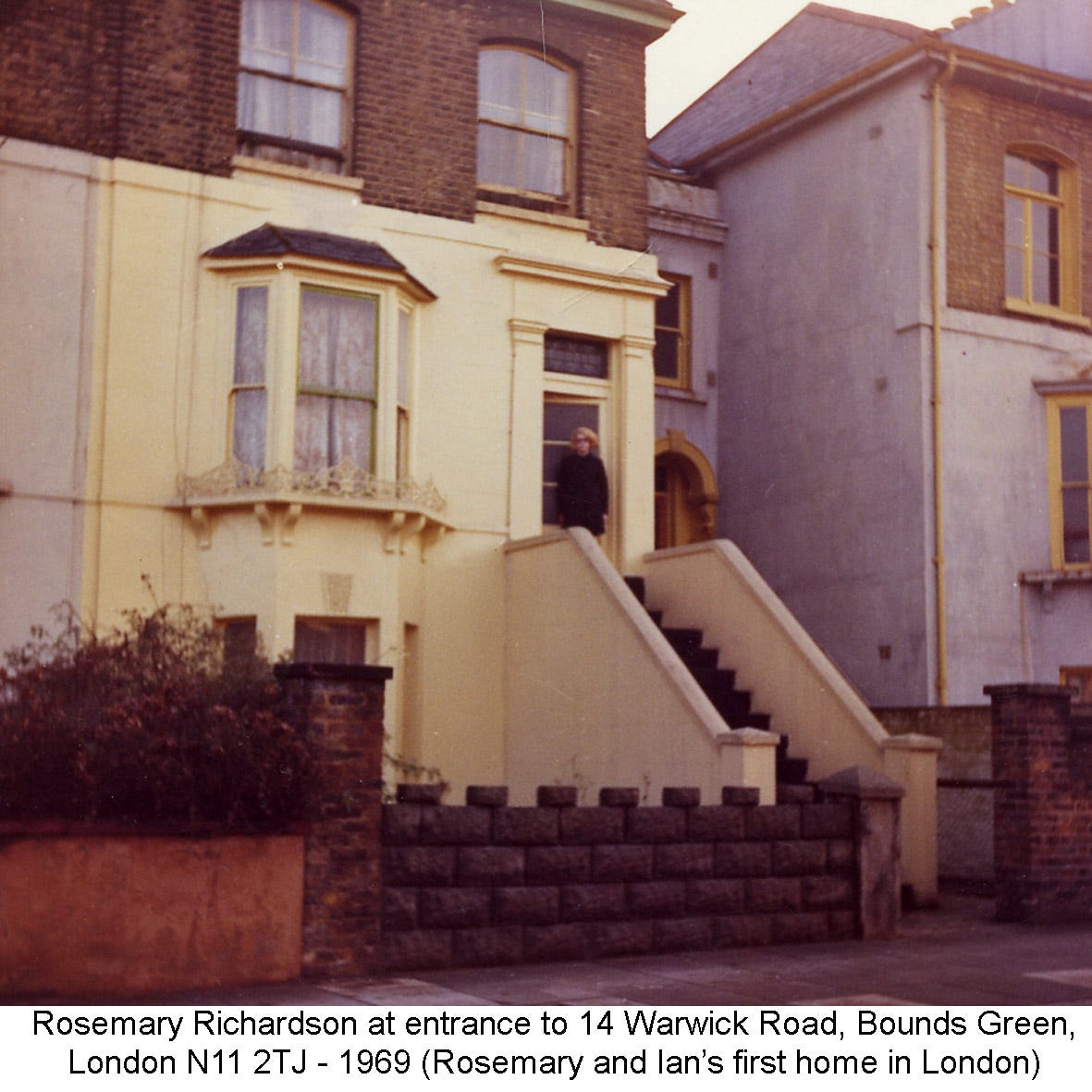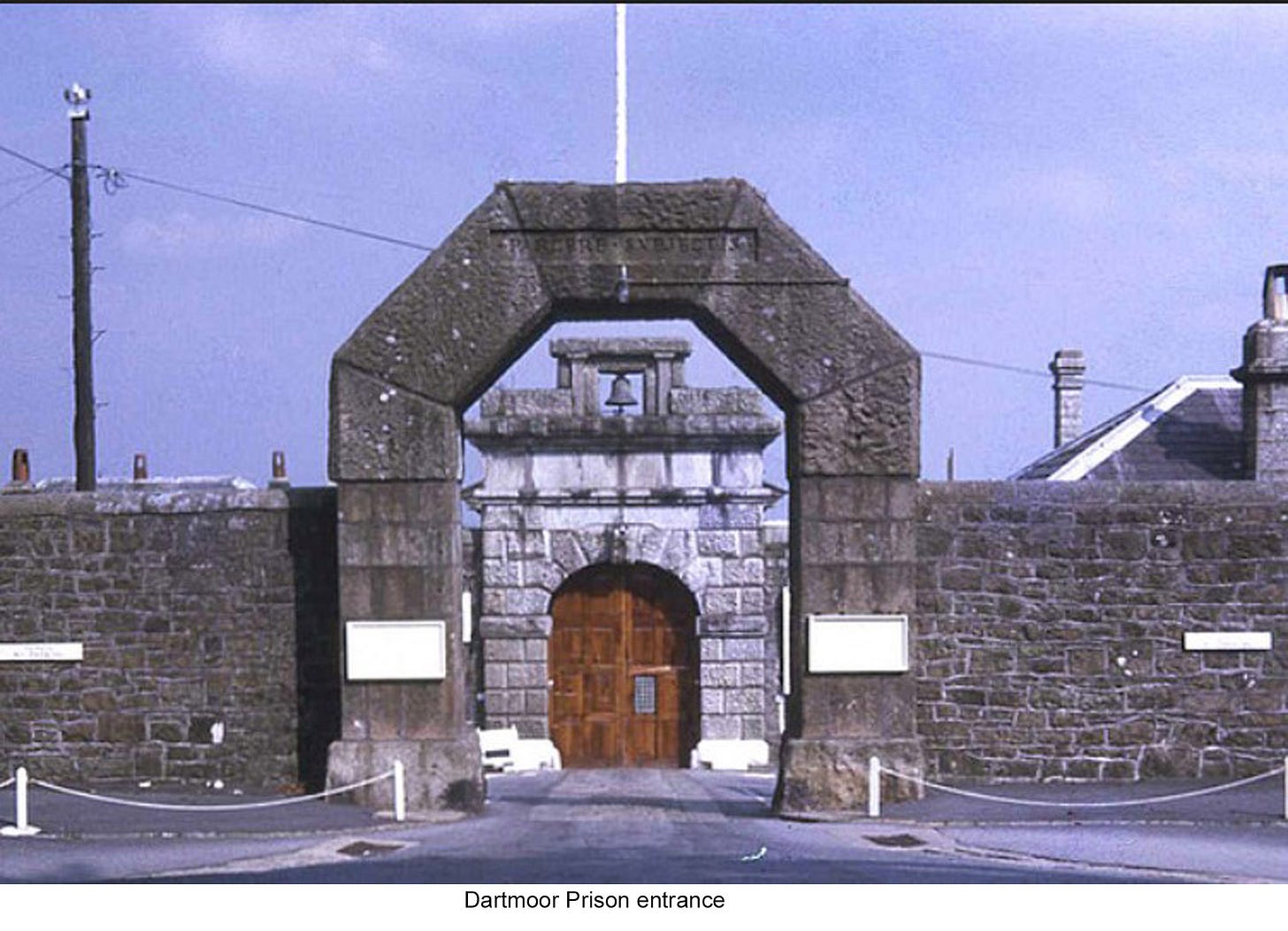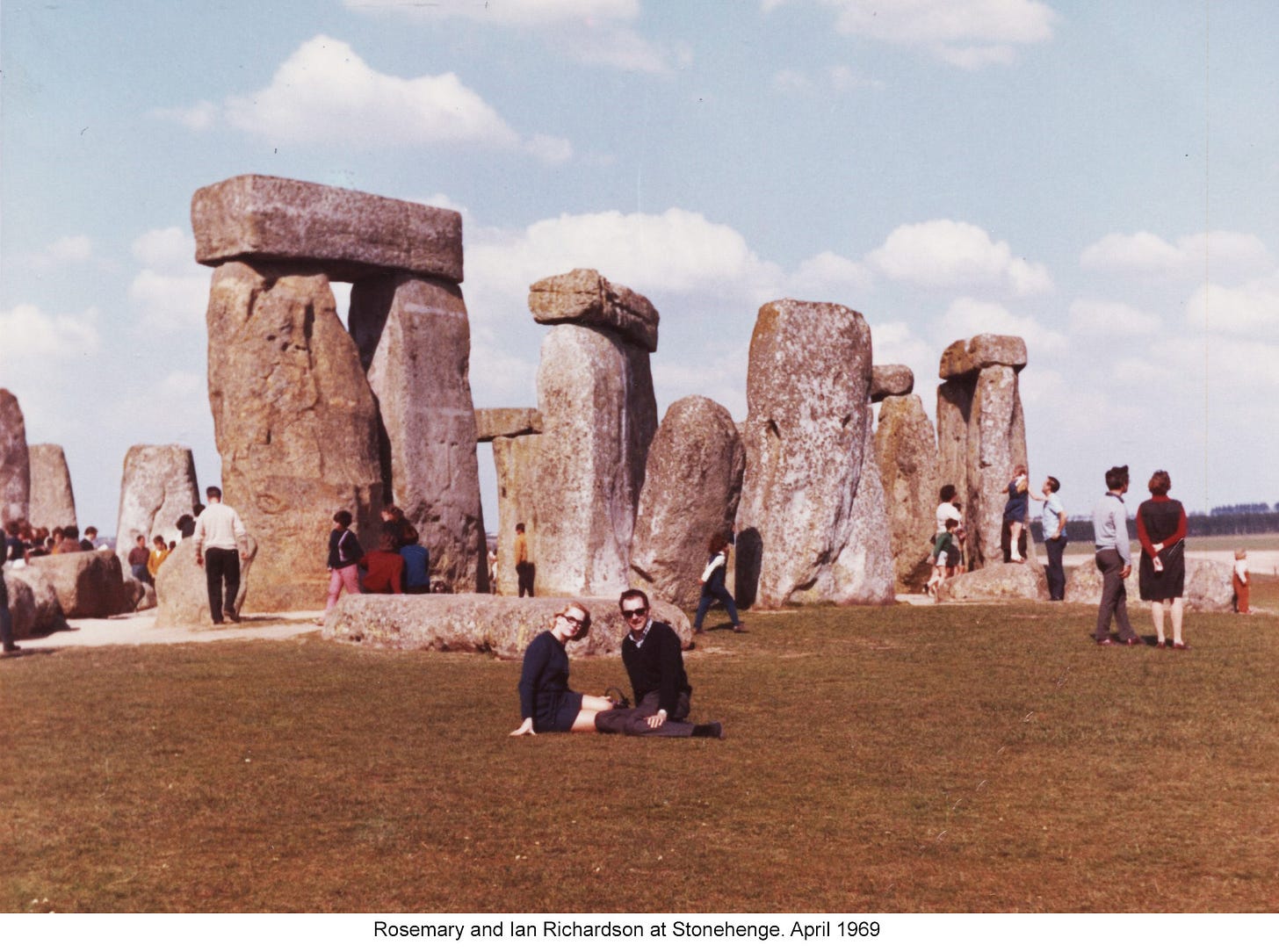Much of this chapter is drawn from letters to my family in Australia. My mother kept all of them and gave them back to me during one of my visits to her…
****
For some unaccountable reason, it took us over an hour to get our luggage from the plane after the four-hour flight to London Heathrow from Moscow. However, we had a smooth trip through customs. The customs officers examined the movie camera and warned me against selling it, but none of the cases was opened. Graeme Henderson - another former 3AW newsman -- and his girlfriend met us at the airport. Incredible, the four of us and our luggage fitted into his mini.
Graeme took us to our hotel -- the King Charles -- and horror of horrors, it was right in the middle of Earl’s Court, widely known as Kangaroo Valley because of the huge number of Aussies there. This was despite telling our travel agent not to accommodate us in Earl’s Court. Never mind, the hotel was comfortable and it had a double bed -- our first double bed since leaving Australia.
We popped down to one of the small but very efficient, modern and cheap restaurants in Earl’s Court and had a marvellous meal for the equivalent of about 40 Australian cents each. To celebrate our arrival in England, I had a steak and kidney pie. The shops look very nice. There are some very weird people around -- particularly among the males. The clothes are very, very kinky.
NOVEMBER 4: The movie camera bought in Hong Kong broke down today, but it was fixed a few days later under guarantee. We found a new and cheaper hotel in Penywern Road that backed onto Earl’s Court Station. The cost was $A6 a double a night, bed and breakfast. Rosemary bought a very stylish black woollen coat today for $A21, about a third less than what she estimates she would have had to pay in Australia. Clothes -- woollens in particular -- seemed quite cheap.
We’ve found the Underground very good, but still not a patch on the Moscow Metro -- for speed and service. However, it was great to be able to read signs in English again. We must be getting blasé about travel. We were not at all excited about London. The trouble is it seems so ordinary after Russia, India and Hong Kong. We’ve been told most people felt this way at first, but then London began to grow on them. Perhaps that will come true after a few days rest.
****
Graeme Henderson, who temporarily working on a farm a little north of London, took us on a drive into the English countryside. It was most interesting seeing the stone and thatched-roof cottages. We particularly enjoyed the time we spent time in Woburn Abbey, the home of the Duke and Duchess of Bedford. Details are here: https://www.woburn.co.uk
Thanks to a friend of a friend we found some accommodation in north London. It is a bed sitter at 14 Warwick Road in the suburb of Bounds Green, costing $A11 a week plus gas. It was a single room with a double bed, a table and two chairs and a kitchenette. It also had a rented television set. There was no refrigerator, so we kept milk and butter cool by leaving them outside on the window ledge. We had to share a bathroom/toilet with the occupant of another bed sitter and the landlord and his wife and son. This was not usually a problem, except when the teenage son had a tantrum and locked himself in the bathroom/toilet. We were amused when we moved in to be told by the landlord’s wife that we must not leave “smalls” (i.e. underwear) in the bathroom/toilet.
We discovered a serious mouse problem in the bed sitter. There were lots of them living behind the unused fireplace and in the walls. They remained a problem for days, despite devouring lots of poison.
We had our White Christmas, although it was most unexpected. At lunchtime the day before, the weather was positively warm for London — about 50 degrees Fahrenheit or 10 degrees Centigrade. Then about three o’clock the temperature began to tumble in defiance of the London Weather Bureau forecast, and snow began falling about eight o’clock. It was quite exciting to stand at our front door and watch the snow fall in the night. We’ve been told that it’s fairly rare for there to be a White Christmas in London, so we’re counting ourselves lucky.
Christmas Day was quite pleasant, although we missed being home with the family. Rosemary gave me a pair of beautiful red baked-enamel cuff links she bought from a “hippie” stall in Portobello Road. We had a light lunch, then in the afternoon walked about a mile and a half through the snow to a widow friend of our Melbourne friends, Gus and Marie Grieve, for an evening Christmas dinner of turkey and fruit mince pies We had a most enjoyable time, but we couldn’t help casting our minds back to the previous Christmas and the family chicken and champagne dinner on the banks of the Murray River at Picola.
On the subject of food, terminology can sometimes be a problem. A friend of a friend invited us around for “tea”. We assumed this to be an evening meal and were surprised to be asked to arrive at 2.30pm. She put on a great spread and at one point I declined a further offer of cake because “I don’t want to spoil my appetite”. Finally, around 5.30pm it dawned on us that we had been invited for “afternoon tea”, not the evening meal. So we offered our embarrassed thanks for her hospitality and left. We have also learned that many posh types don’t have their evening meal until about 9pm and call it “supper”.
We were also invited to visit Kitty (can’t remember her surname) at her home north of London. We first met her in Melbourne where she was a friend of Deidre and Ron Winsall. Alas, the main reason for the invitation was for her to show us the hundreds of Kodachrome slides taken on her voyage back to her home in the UK. Most of the slides were of fellow travellers standing in front of famous sites such as the pyramids. Fair enough, but she felt the need to tell us the name and backgrounds of everyone pictured. Dull, dull, dull. She also showed us some slides that were black apart from pin-pricks of light. “These are of another cruise ship we passed in the middle of the night,” she informed us. “I can’t understand why they didn’t come out because I had the flash turned on!”
One of the most popular eating places in London was Joe Lyon’s tea houses with their waitresses wearing their distinctive uniforms. My mother went to the one in Piccadilly Circus during her visit a few years ago to the UK and was most impressed. She insisted we most go there ourselves, which we did. We were most disappointed. We found it grubby and thought the food was very poor.
We love touring London and we got a couple of Red Rover tickets (the ones that permit unlimited travel on the double-decker red buses for one day). Among the many stops were Trafalgar Square and Piccadilly Circus where we took the usual tourist-type photos and films. I guess we spent four hours in actual bus travel, using a total of nine buses. Not bad for seven shillings each.
We made a visit, mostly by train, to Angmering-on-Sea on the south coast of England to see distant Cox cousins Edgar and Kathleen Evans. During and after WW2, there was food rationing in the UK and Mum used to send the Evans parcels of tinned fruit and vegetables, which were very much enjoyed. We had a lovely long and enjoyable chat.
Rosemary was quick to get a job as a secretary with Costain and Press, the London branch of the company that employed her in Melbourne. It’s nice to have that income. As I learned touch typing when working with the Charlton Tribune, I’ve been getting short-term jobs as a “temp”. I now have a job with the Institute of Marketing mentioned in Chapter 15 <Institute of Marketing>
More on the Institute of Marketing from a letter to the family dated January 15, 1969:
I’m still with the Institute of Marketing. I began the week as secretary to the Company Secretary but am ending it as Acting Secretary. It’s a real joke. I don’t even know half the departments in the Institute, let alone the people who work in them, yet I’ve been left with the job of carrying on day-to-day procedures until the Secretary gets back — probably next week. I’ve even been authorized to sign official documents and letters on his behalf. I’m thinking of authorizing myself a pay rise! Still, I’m not really grumbling because I’m picking up some valuable information in business administration, and anyway, I don’t mind a bit of responsibility.
Absenteeism is a real problem here. Workers stay at home at a mere whiff of a germ or inconvenience. Some examples: One girl at the Institute of Marketing stayed at home for three days because her girlfriend had a cold and "needed looking after”; another stayed at home for a similar period because her husband had the ‘flu and “wouldn’t stay in bed unless I was there to make him". But the best is one girl who has worked only one full week since she began her job nearly three months ago. Rosemary has found very much the same sort of thing at Costains. A couple of girls there arrive for work five to 10 minutes late each morning. They say it’s impossible for them to arrive on time because it would mean them getting up 20 minutes earlier. Another girl was recounting how she had once applied for a secretarial job. “I was taken into a room and two or three men there started asking me all these questions about where I’d been to school and what exams I’d passed,” she said. “What a bloomin’ cheek. I told them I didn’t want no job with them!”
A mate took a temporary job as a forklift driver. He was told to start work at 6.00am because there was a backlog of work to catch up with. He arrived at 5.45am. No one in sight. At 6.15am the factory was opened up and everyone adjourned to the canteen. Work began at 7.00am. At 9.00am there was a half-hour break because of the early start. At 10.00am there was the normal half-hour break. At noon he went for lunch. On my mate’s return, everyone else went for lunch, leaving him with nothing to do until 2.00pm. At 3.00pm, time for a half-hour afternoon break. 5.00pm, knock off for the day. Estimated period of genuine work: 1½ hours.
A former 3AW colleague Johan “John” Ramsland was in touch and invited Rosemary and me to join him for a meal at one of London’s oldest pub, The Anchor, on the Southbank. It was very enjoyable. John came here about 18 months ago after a long-term relationship with a woman at 3AW broke down. He now had a sub-editor’s job at BBC External Services (later BBC World Service) in Bush House, Aldwych. He suggested that I apply for one of their summer relief jobs while I tried for other jobs and made arrangements to move to Canada and New York. He warned me that the BBC was slow in dealing with job applications — and this proved to be true!
I’ve had a busy week doing freelance stuff. The highlight was an exclusive interview I did with Miss World, Penny Plummer of Sydney. I’ve sold it to both 3AW and 2GB, so with their various network tie-ups the tape will be carried by about 30 stations, with a further 10 or so getting a scripted story. The interview was designed for both news and general programming. I was quite impressed by Penny. She was very natural, not at all like the American-type beauty queens, and was a good advertisement for Australia.
We also went to the BBC TV Centre where I interviewed Australian actor Ray Barrett — Peter Thornton of television series, The Troubleshooters. He was very good, and it was probably the best interview I’ve done. He invited us to watch rehearsals, and Rosemary got quite a thrill to meet and talk to Philip Latham who plays the part of Willy Izard in the series. We were specially interested because The Troubleshooters is our favourite TV show after Softly Softly.
I also did an interview with the 17-year-old Australian pop singer Cheryl Gray (later to be renamed Samantha Sang). You may remember her hit record You Made Me What I Am. Her parents, singers Joan Clarke and Reg Gray, were well known in Australia for their performances on Graham Kennedy’s TV show In Melbourne Tonight. Joan and Reg were with Cheryl in a flat in London while she tries to break into the big time internationally. She has an extraordinarily strong and mature voice, and I’m sure she’ll make it big one day. She was quite unspoiled, and Rosemary and I found her parents very friendly. We enjoyed the night out very much. (It was the start of a long term friendship.)
Rosemary and I went to the Hippodrome Theatre for an interview with Rolf Harris who had just completing another TV series and who was shortly to return to Australia for a holiday. He did a good, and sometimes quite funny, interview, but we didn’t have much time to really judge him as a person because he was in a hell of a rush to start rehearsals for his final show. But I should hope his home is tidier than his dressing room. The dressing room looked quite imposing from the outside, what with its chrome-plated door and embossed stars, but inside it was an absolute mess. Clothes, sheets of art paper and tins of paint were everywhere, and there was hardly room for us to sit down. We arrived as he was in the middle of cleaning his teeth. He spent a fruitless frothing-at-the-mouth search for a towel, but had to settle in desperation for a hankie. Such is the life of an international TV star! (More on my dealings with Rolf Harris can be found on my BLOG.)
Rosemary has become a keen knitter and has produced a red and white football scarf which she will send to her father who is a dedicated South Bendigo football fan. She also knitted herself a dress. It’s the first knitting she has done since she was at school in Bendigo.
One of the most impressive places in London is the very grand Royal Albert Hall opened in 1871. We attended several of their excellent Sunday night orchestral concerts. We paid less than a pound each for seats in the top balcony. Leading the bill one night was Tchaikovsky’s 1812 Overture. It was performed by the Royal Symphony Orchestra, the Band of the Grenadier Guards, the hall’s huge pipe organ and cannon effects. We were aware that there were to be these “cannon effects”, but we weren't prepared for such realism. About a dozen deafening explosive charges were detonated during the performance. The ancient hall literally shook with the blasts. So did we. It was, if you will allow the pun, an explosive performance. And certainly one we’ll always remember.
We’ve bought a second-hand Morris Minor 1000 16cwt van. It’s about 15 months old and the cost is only £200 plus £25 a year road tax (the UK equivalent of car registration in Oz). It was recommended to us for travelling on the Continent because they’re so simple to repair should it develop problems. We decided in favour of a van because 1) they’re cheaper than cars and 2) because they’re easier to cart luggage about and can be used for sleeping if necessary. With a bit of luck, we should be able to sell it back for very little depreciation.
On first impressions, the van is better than we expected, and we’re not going to have any trouble putting a foam mattress in the back as a mobile bedroom. We’re buying a couple of cheap sleeping bags, so everything should be just great for travelling about. Our landlord is a carpenter and he is building a wooden box that fits neatly in the gap left when the passenger seat is tipped forward. This will provide extra space on the mattress for my longer legs when sleeping. We’ve been told the van will have a fuel consumption of about 40 to 45 miles per gallon, which is just as well seeing that the cheapest petrol costs about six shillings a gallon!
We gave the van a successful try-out with a trip to Southend-on-Sea, then called in at the port of Tilbury on the way back. Both places were pretty tatty, but it was interesting to see them. The 40-mile trip there took us two hours. This was because the roads were rather narrow and crowded and because we were travelling through built-up areas most of the time. We were rather disappointed by the roads. We thought they would be better. Roads are graded "M" (for motorway), “A” and “B”. The motorways are fantastic, but the A and B roads mostly are not as good as the average sealed road in Victoria. And of course they are always crowded. The van went like a bird — much better in fact than we had hoped. It’s no racing car, but it has plenty of pull and cruises very comfortably at about 55 miles an hour.
The Canadian High Commission (Embassy) has made it clear that there is no way it will allow Rosemary and me to move to Canada (see Chapter 15). A duplicated rejection letter declared that the decision was “for your own good”. So that plan is down the gurgler. However, Rosemary has discovered that anyone whose father or grandfather was born in Britain has unrestricted entry. As dad was born in Glasgow, this will mean that we don’t have to worry about being tossed out at the whim of the Home Office. We have no intention of staying here, but after the Canadian fiasco, it’s nice not to have to worry about our entry permits here.
We were surprised to see that Downing Street, home of Prime Minister Harold Wilson, is open to the public just like any street. (Much later Margaret Thatcher had security gates installed when she was PM.) I was able to go to the entrance of 10 Downing Street and have a friendly chat with the copper standing guard, but wasn’t allowed inside.
Rosemary has been given a promotion by Costain. She will receive an extra £3 a week and has even been offered an assistant. She's now being paid more than she was in Melbourne, which is almost incredible, taking into account the wages over here.
A wonderful trip to the West Country
We went directly westward from London through Bath, a magnificent Roman city, then on to Bristol, Weston-Super-Mare (the English idea of a seaside) and Cheddar (the village where all the genuine Cheddar cheese is made). We camped in the back of the van in a camp site-cum-cow paddock just outside the village for the first night. The van was most comfortable, although a little crowded because we haven’t yet got the shelving arranged.
From Cheddar we went to Wells to inspect the Cathedral there. We were most fortunate to arrive during choir rehearsals, and it was beyond description the enjoyment we got from hearing the clear, ringing boy sopranos' voices, no matter what part of the building we were in. We could have stayed for hours, but time was against us.
From Wells we went through Glastonbury (inspecting some 7th to 12th century ruins and the site of King Arthur’s grave), Dunster (a marvellous little village complete with cobblestone footpaths and in the shadow of a castle perched on an adjacent mountain), a number of charming villages, and to Exeter where we were booked into a farmhouse for two nights.
The charge was £2 a double per night, bed and breakfast. so we had expected something rather basic. Instead we found ourselves in a centrally-heated Georgian mansion about 300 years old. Our room was about 20-ft square and extremely comfortable. I am sure comparable accommodation in Australia would cost £5 or £6 a night.
Next day we set out across Dartmoor to have a look at the Dartmoor Prison, a most forbidding place of grey stone.
Then to the fabulous seaside town of St Ives with its narrow cobble-stone streets. From there to Penzance (very disappointing) and on to Land’s End. There was nothing much there, but it was very pretty.
Then around the south coast along roads lined by high thicket hedges and so narrow that when we met another vehicle, one or other of us had to back up to a layby or paddock entrance. Next was Mevagissey, a genuine Cornish fishing village. The streets were Olde Worlde, very narrow, winding, with tiny lanes leading to all sorts of interesting places. It is almost impossible to drive through the village because of the narrowness of the streets. The village probably hasn’t changed for many centuries, except in minor ways.
Another night at the farmhouse, then a quick trip into Exeter to inspect the fine cathedral before heading home via Salisbury (another great cathedral) and Stonehenge. It was a real thrill to inspect Stonehenge after having seen and heard so much about it. The monument stands in all its glory in the middle of a field and we were able to go right up to and inside it. The cafes and other trappings of a tourist centre were about 200 yards away and underground, out of sight, so not to spoil the overall effect. Stonehenge is smaller than we had envisaged it, but most interesting.
From Stonehenge we entered the worst traffic jam I have ever been in. The bank-up of cars stretched from Stonehenge about 70 miles to London along the A303. It took us about an hour to go about five miles, but we finally managed to cut across country to the M4 Motorway, which gave us a much better run.
Next chapter: More on life in the UK and my early days at the BBC.















As always Ian,a very interesting read..
With a "cuppa" I sit back and enjoy the wonderful journey you and Rosemary have had ...
However ...returning to Australia would to me ..make it a perfect final chapter ...as originally
it was only meant to be an 18 month adventure !!
🇦🇺 ..cheers to you both..Helen